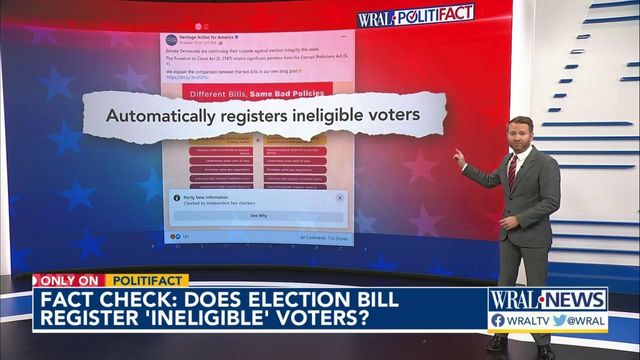Fact check: Does Democratic bill automatically register 'ineligible voters?'
Senate Democrats are trying to rewrite national rules for voting, drawing attacks from conservatives who say state legislatures should be allowed to control the rules for registering voters and casting ballots. PolitiFact checks their claim.
Posted — UpdatedSenate Democrats are trying to rewrite national rules for voting, drawing attacks from conservatives who say state legislatures should be allowed to control the rules for registering voters and casting ballots.
One Facebook post suggests two Democrat-backed efforts "automatically registers ineligible voters."
These characterizations are wrong.
"States will not have to enroll ineligible voters," said Matthew Weil, an elections expert at the Bipartisan Policy Center. "The text of the bill clearly lays out that this is a process only for eligible individuals, and it’s a transfer of info from the DMV to election officials."
Automatic voter registration "is less automatic than its detractors make it out to be," he said.
Automatic voter registration is used in many states
While the legislation specifically applies to federal elections, as a practical matter states don’t use a separate process for registration for state elections, so the provision on automatic voter registration would apply broadly. This part of the legislation was written to take effect in January 2023.
Under the Freedom to Vote Act, citizens who access government services at a motor-vehicle agency would have their information automatically transferred for voter registration unless they decline to register. This is referred to as an "opt out" provision.
- The legislation states that the goal is to "enable the state governments to register all eligible citizens to vote" and to protect and enhance the integrity "of the electoral process for all eligible citizens."
- For agencies that request applicants to affirm United States citizenship, the agency "shall inform each such individual who is a citizen" that "unless that individual declines to register to vote, or is found ineligible to vote, the individual will be registered to vote...."
- The legislation expressly bars an agency from providing an opportunity to register to vote if the individual didn’t "affirm United States citizenship" or if the agency has evidence that "the individual is not a United States citizen."
- Within 10 days of a transaction with an "eligible individual" at the DMV, the agency shall electronically transmit information to state election officials including "information showing that the individual is a citizen of the United States."
For any agency that does not request that individuals affirm citizenship, the legislation has a separate process. The bottom line is that the legislation doesn’t change the federal law that only eligible citizens are allowed to register to vote.
Asked about the Facebook post, Noah Weinrich, a spokesperson for Heritage Action, said the bill’s opt-out system means it will "inevitably include some ineligible voters like noncitizens who interact with agencies like the DMV. The bill does not contain adequate safeguards against registering ineligible voters."
But the legislation states that noncitizens who end up registered to vote shall not be prosecuted or face immigration consequences if it was due to "individual or agency error" or did not make an affirmation of citizenship.
"Those are system glitches, technical problems that absolutely should be fixed. Proving citizenship would not fix them. They were problems in how the systems were designed and they were fixed," he said.
PolitiFact ruling
Heritage Action said the Freedom to Vote Act "automatically registers ineligible voters."
Heritage Action points to the automatic voter registration provision, which would forward individuals’ information from the DMV to state election officials unless they opt out of registering to vote. But this provision repeatedly states that only eligible citizens are allowed to register to vote.
Noncitizens have wrongly ended up on voter registration rolls in states that have adopted automatic voter registration. But experts say such errors are rare, and could happen even without automatic voter registration.
The post ignores the language of the law and goes too far by suggesting that the bill would automatically register ineligible voters.
We rate this statement False.
Related Topics
Copyright 2024 Politifact. All rights reserved.





